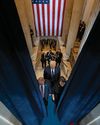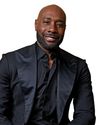
FOR NEARLY FIVE HOURS I ALTERNATE between lying in a fetal position on our bathroom floor and curling up against the wall, shivering uncontrollably one moment and burning up the next.
I vomit three times on the floor. I rock back and forth in tears, repeating out loud, to myself, to God, to my husband and my dog on the other side of the door, to please, please make this stop. The pain is so blinding that I think I'm hallucinating.
It goes on so long, I don't have the energy to scream, at what feels like every single bone in my body crumbling, my body breaking apart, collapsing into itself. Between each new wave of pain that comes, I try to focus on the broken grout between the floor tiles.
I pass out twice. I am terrified that I will die.
No one should have to fear they may die because of a miscarriage. And yet, for women like me in the United States, in Texas, that fear is very real.
The day before-Labor Day-we had checked into the ER after I began to bleed at work. At nine weeks pregnant, I feared the worst but hoped it was nothing. Panicking at my desk, I immediately called my best friend, who told me to go straight to the emergency room.
At the ER, that panic deepened. The Dobbs v. Jackson Women's Health Organization decision by the U.S. Supreme Court, which overturned a woman's constitutional right to an abortion, had been passed three months earlier and, for the first two hours in the waiting room, I could only think of how that decision would now trickle down to me, here.
My brain anxiously cycled through every bad scenario that could happen. My concern wasn't misplaced.
I was eventually called back for bloodwork and asked questions that were probably standard, but sounded increasingly cold and accusatory, about why I was there. I repeated for what seemed the tenth time that I thought I was having a miscarriage.
This story is from the February 16, 2024 edition of Newsweek US.
Start your 7-day Magzter GOLD free trial to access thousands of curated premium stories, and 9,000+ magazines and newspapers.
Already a subscriber ? Sign In
This story is from the February 16, 2024 edition of Newsweek US.
Start your 7-day Magzter GOLD free trial to access thousands of curated premium stories, and 9,000+ magazines and newspapers.
Already a subscriber? Sign In

Mark-Paul Gosselaar
HE'S BEEN IN THE BUSINESS FOR MORE THAN 40 years, but Mark-Paul Gosselaar still feels like he hasn't experienced everything.

The SECOND COMING
As he returns to the Oval Office, DONALD TRUMP has promised 'a golden age' after he was 'saved by God to make America great again.' Is his optimism justified?

Chatbot Therapy
Could artificial intelligence replace human support for mental health care? Newsweek asked the experts

TRUMP'S LICENSE TO DRILL
After pumping money into the election cycle, the oil and gas industry now want the president to follow through on his pledge

Failed Lovers, Lifelong Friends
'What initially attracted you to a person need not be wasted...it can be used to build something new'

Animal Instincts
Primates practice different mating styles but empowered females help create harmonious families. Humans could learn from them

Morris Chestnut
FROM BOYZ N THE HOOD IN 1991 UNTIL NOW, MORRIS CHESTNUT HAS SEEN much of Hollywood.

MOST TRUSTED BRANDS 2025
TRUST IS A CORNERSTONE OF MEANINGFUL RELAtionships. When dealing with businesses and brands, it's often the deciding factor that separates the companies we rely on from the ones we don't.

Kenya Barris
KENYA BARRIS, THE EMMY-NOMINATED CRE-ator of Black-ish, knows that him teaming up with Malcolm Gladwell for the new Audible series The Unusual Suspects is a bit of an odd pairing. “We’re actually not as odd, but it’s an interesting combination.” And their guest list is just as diverse, from entertainment figures like Jimmy Kimmel and Ava DuVernay to renowned chef David Chang.

The Man Behind Israel's Charm Offensive
Gideon Sa’ar wants to change the world’s perception of his country. Some say the Israeli foreign minister will need to be a real magician’ to pull it off